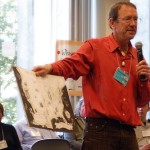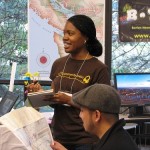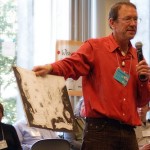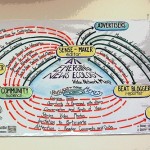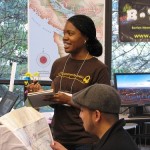Two provide detailed recent reports and plans at JTM-PNW’s site. One is the Seattle Digital Literacy Initiative. More here from the UW School of Communications, which is providing funding and a home for the project for two years. This is an impressive development which reflects the valuable role JTM-PNW plays as an instigator and enabler for innovation. Another recent update is from JTM-PNW’s Building On Transparency effort, which I am helping to advance as part of my work for Countywide Community Forums (CCF), a public engagement program in King County which is underwritten by private donors, most notably the Spady family of Dick’s Drive-In Restaurants in Seattle.
CATCHING UP AND MOVING FORWARD
Another of the 10 JTM-PNW initiatives is the News Collaboratory, which meets monthly. It helps chart JTM-PNW’s overall direction, serves as a resource and connector for the initiatives. Monday July 26, the JTM-PNW News Collaboratory organized a potluck gathering at the Filipino Community Center in Southeast Seattle so a broader group of initiative leaders and interested others could connect, share news and lay plans for future face-to-face gatherings and further development of the initiatives. We were pleased to be joined by several distinguished guests who came to listen. They were Rita Brogan, CEO of PRR Inc., a public affairs and community engagement firm based in Seattle; new media maven Monica Guzman, now of Intersect; online guru Jason Preston of Parnassus Group and Eat Sleep Publish; and communicator Carrie Shaw, also a CCF colleague of mine.
ABUNDANT JOURNALISM
Opening the reporting session, ex-Seattle Times Executive Editor Michael Fancher emphasized his Abundant Journalism initiative is envisioned as an information clearinghouse that would grow into a role of finding funding to help start-up enterprises in the news and public information space. He is looking to get a few more core members to help him guide the initiative. Most of Fancher’s time has been focused on nationally-recognized research and report-writing work for the Knight Foundation and Aspen Institute on the future of journalism and news information. He has also maintained and updated JTM-PNW’s web site, and served as a member of JTM-PNW’s News Collaboratory.
MICRO-FINANCE
Michael Bradbury of RealScience, Inc. reported on a new JTM-PNW initiative that he said could fold nicely into Abundant Journalism: business training and micro-finance for aspiring journalism entrepreneurs. As a 501c3, JTM-PNW could become a micro-lending program, especially if paired with business skills development for emerging small business enterprises in the regional news ecosphere, Bradbury told the group. This possibility arose after Bradbury reached out to the Washington Community Alliance For Self-Help (CASH), which provides business training for immigrant populations and individuals subsisting at up to 200 percent of the poverty level, who are seeking to establish small retail businesses. Washington CASH wants to expand to include other business sectors that have been affected by economic changes, specifically including journalism, Bradbury learned. Washington CASH has offered one free training slot to an applicant recommended by JTM-PNW, and we are exploring whether that number might be able to be increased. Several applicants have already expressed interest. Additionally, JTM-PNW is discussing how it would work with journalists who complete Washington CASH training to share lessons learned and help begin raising money for micro-lending to qualified news and information business endeavors.
DIGITAL MEDIA LITERACY
Daniel Hannah, and later Jonathan Lawson of Reclaim The Media reported on the considerable success of the Seattle Digital Literacy Initiative, which was born at and after the January JTM-PNW conference. SDLI has secured two years of funding through the University of Washington Department of Communications to work with youth in community settings to help develop their critical media analysis and consumer skills as well as their media production capabilities. Project leader Sarah Stuteville, of The Common Language Project, was Back East attending a conference.
RESOURCE MAPPING
Jacob Caggiano reported that the mapping initiative funded by the Washington News Council and its Executive Director John Hamer is shaping up. This alliance also developed as a direct result of the January conference. The Google Map-based project is part of WNC’s Washington News Lab and Directory and now includes contact and Web information on 451 different entities from among legacy media, the blogosphere, and civic groups. The News Council has invested considerable capital in developing the project and so for now, will be making it available only to dues-paying members. JTM-PNW Collaboratory leaders later expressed their support for the project but also indicated they may explore facilitating the development of a similar tool that is free and open.
ETHICS
Hamer reported on the News Council’s ongoing T.A.O. of Journalism initiative to encourage practitioners to sign a pledge and post a badge of compliance on their sites to the principles of transparency, openness and accountability. The council – which focuses on journalistic best practices and ethics – has also unveiled a new Web site developed by Brian Glanz and Charlie Hamilton, and continues its own blogging initiative, assisted by writer Heidi Dietrich.
TECHNOLOGY
Charlie Hamilton of the Technology Initiative reported the new JTM-PNW Web site is nearly ready. It is expected to go live in August. JTM-PNW has contracted with Cate Montana of The Global Intelligencer to curate material for the Web site and assist in informational outreach to initiative leaders and conference attendees. As the site develops, community features will be unveiled and promoted.
INCUBATION
Peggy Holman, a JTM national co-founder and co-convenor of the January conference in Seattle reported on the Collaboratory initiative, which she leads. She said, “We’re supporting the pioneers who are shaping the news and information ecosystem, being eyes and ears, noticing what’s possible.” Holman’s new book, “Engaging Emergence: Turning Upheaval into Opportunity” is due out soon.
GLOBAL HEALTH REPORTING
Sanjay Bhatt, a reporter at the Seattle Times, and Pamela Kilborn-Miller of the Dalai Lama Center spoke about the Global Health Reporting Initiative which emerged out of the deep philanthropic support in the Seattle area for global health initiatives, and the presence of many talented health writers and reporters here. The initiative is doing a cross-sector stakeholder survey to help shape future efforts. Another initiative member present was Michael McCarthy, founder of Seattle/Local Health Guide, now a partner site with the Seattle Times. Bradbury also reported on the Seattle Happiness Index Initiative, which will seek to provide objective indices of community well-being. It isn’t really off the ground yet, he said, but will get there eventually.
OPEN GOVERNMENT
I reported on Building On Transparency, which seeks to develop community capacity for using open government and especially online government data and documents to help improve quality of life, dialog and governance. A report and detailed plan is here. I also discussed a core project in the initiative, Public Data Ferret. It is a database of blogged synopses of important public documents and databases which might otherwise go overlooked. They are indexed and searchable by topic and jurisdiction at the Ferret Hub. There is also an archive of weekly Public Data Ferret radio segments on KOMO-AM 1000 in Seattle. I expressed appreciation to JTM-PNW Collaboratory member Andrew Hart for his work as Contributing Editor at Public Data Ferret, and other work on behalf of JTM-PNW. Hart, a recent grad of the UW Communications School, was a participant in the January conference.
INVESTIGATIVE REPORTING
The group then heard from Rita Hibbard, a former Seattle Post-Intelligencer editor who is now Executive Editor of Investigate West, an investigative reporting project that works in partnership with major media outlets. Investigate West is not a JTM-PNW initiative per se, but Hibbard was an active participant in the January conference, leading a vigorous discussion in the Open Space setting. The assembled group last week welcomed the chance to hear Hibbard report on IW’s impressive debut. Investigate West, Hibbard said, is doing original investigative reporting work, with articles running in major media such as MSNBC, the Seattle Times, Seattle PI.com and the Spokane Spokesman-Review. The project draws financial support from foundations, membership fees and payments from media partners for content. IW is interested in finding ways to work with news consumers, Hibbard added.
CIVIC COMMUNICATIONS COMMONS
Rick Vanderknyff, Managing Editor of Microsoft Local, reported on the Civic Communications Commons Initiative, which has an active and broad steering committee – including Anne Stadler, a longtime dialog facilitator, Seattle media figure and community activist. Work to date includes a completed concept and planning document, regular planning meetings and extensive outreach to potential partners. CCC has 501c3 aims. Vanderknyff told the group that the initiative will include an online commons, a publicly-held place where people can meet; and in-person conversations around the county. The focus will be on dialog around important issues; and serving as a hub on news and information resources. A number of partnerships are expected to be explored with major players in the civic, corporate and communications sectors. Undecided yet are geographical scope (King County versus greater Puget Sound), and exactly what would be at the Web hub.
NEXT STEPS
An open discussion by the initiative leaders of JTM-PNW followed. We agreed to meet quarterly in person, and to begin scheduling monthly events around each initiative. We also discussed different types of events we could hold to promote the initiatives. Sanjay Bhatt had an inspired suggestion for Flash Mobs around mobile food carts (“hook up in Ballard for burritos and talk on transparency.”) He also shared the model used at Asian-American Journalists Association “Innovation Salons”: 30-45 minutes of meet and greet, a 60-minute program, and 45 minutes more of socializing and directed networking. Other possibilities raised were mini-conferences of up to three hours, or convening a public conversation around a cross-cutting topic.
Additional suggestions to help the initiatives gain momentum included: provide “how-to” mini-seminars with initiative leaders (or others) sharing success stories; conduct concept-vetting sessions where one initiative is critiqued by other initiative leaders; share tools such as the survey approach being used by the Global Health Initiative; form a steering committee; reach out beyond the usual suspects: and give presentations to civic, professional and community groups.
Thanks everybody for a great, productive gathering!
